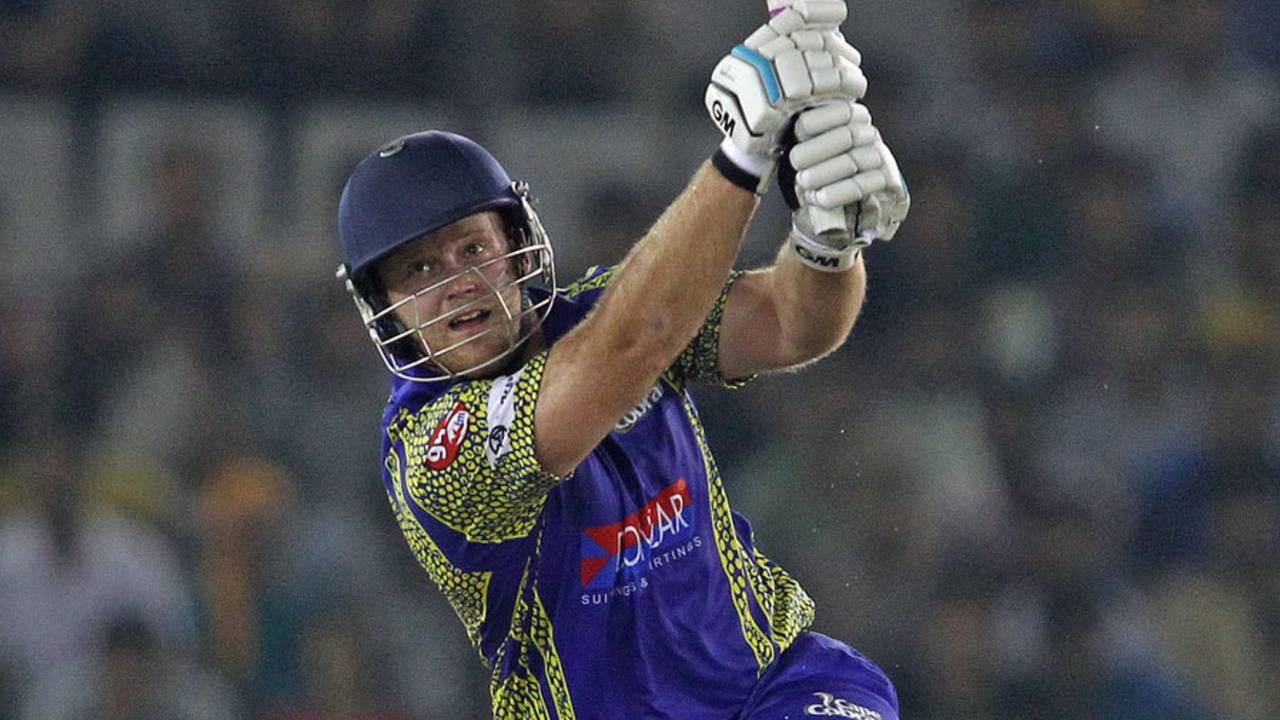South African trio receive MCL clearance
A late agreement has allowed the South African players involved in the MCL to participate in the semi-finals and eased concerns about the future of the competition
George Dobell
Feb 10, 2016, 6:00 PM
Richard Levi is one of three South Africans now given clearance • BCCI
A late agreement has allowed the South African players involved in the MCL to participate in the semi-finals and eased concerns about the future of the competition.
Shortly after the ICC issued a thinly veiled warning that the competition's 'approved status' could be reviewed in light of the involvement of players with inadequately completed No Objection Certificates, the players involved agreed a deal with their national boards whereby they received the clearance required.
Specifically, Richard Levi, Rory Kleinveldt and Robin Peterson all went to the tournament with NOCs signed by their South African franchises but not by their national board. As a result, the ICC contacted organisers of the MCL and made it clear that was unacceptable to them. The MCL responded by leaving the players out of subsequent games, but have now reached an agreement which ensures their availability for the semi-finals and beyond.
It is understood by ESPNcricinfo that agreement was reached when the players paid a portion of their tournament and franchise earnings to CSA. Levi, who represents Gemini Arabians, and Peterson, who represents Leo Lions, are both now available in the semi-finals. The deal comes too late to help Kleinveldt, of Capricorn Commanders, who have already been eliminated.
"There have been some players who allegedly do not have NOC's from their home National Boards," an ICC spokesman told ESPNcricinfo. "The ICC regulations require the NOC to be granted by the National Board and not a franchise. This has been brought to the attention of the organisers.
"The decision not to disapprove the event was made in respect of the 2016 event only. There are a number of factors that need to be taken into consideration before any future event is approved or disapproved."
The MCL's organisers, knowing they require ICC approval to have a viable tournament, have made it clear they will jump through any hoop to ensure the event is sanctioned in future. But to ensure that, they may have to more closely define the definition of "retired" as it applies to players involved in the tournament.
While the ICC were originally of the understanding that only players who had retired from international cricket would be considered for eligibility, it has subsequently become clear that many involved retain aspirations to play at the top level. As a result, some boards - especially Pakistan, South Africa and West Indies - are concerned the MCL could dilute the quality of domestic tournaments taking place at the same time. In future, it seems likely the ICC will ask that players have provided a written undertaking to retire and perhaps have been out of the international game for a minimum of 24 months.
Whether that is a reasonable request is debatable. Many other T20 leagues take place during the domestic season of rival nations and compete for the involvement of the same players. But the MCL, without a backing of a Full Member board and still fighting to find its feet in the busy T20 calendar, does not have the bargaining power of other leagues.
"There's a lot of potential in this tournament to continue," Adam Gilchrist, captain of Sagittarius Strikers, said. "It could become something that is very much a feature of the cricketing landscape and an opportunity for players to continue playing the game.
"It'll take some settling period to work out exactly where and how it fits in, but I wouldn't think you'd see people cut their careers short, in a desperate attempt to get into the MCL. It's an addition to the end of your traditional cricket career."
The other issue facing organisers is that of late payment. Most players were due to have be paid 50% of their fee upon arrival but have only recently received payment. There is some unease at continuing delays, though organisers have promised full payment and guaranteed it through the contracts.
George Dobell is a senior correspondent at ESPNcricinfo
